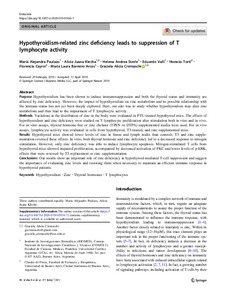Por favor, use este identificador para citar o enlazar este ítem:
https://repositorio.uca.edu.ar/handle/123456789/14235| Título: | Hypothyroidism-related zinc deficiency leads to suppression of T lymphocyte activity | Autor: | Paulazo, Maria Alejandra Klecha, Alicia Juana Sterle, Helena Andrea Valli, Eduardo Torti, Horacio Cayrol, María Florencia Barreiro Arcos, María Laura Cremaschi, Graciela A. |
Palabras clave: | GLANDULA TIROIDES; HIPOTIROIDISMO; LINFOCITOS T; ZINC | Fecha de publicación: | 2019 | Editorial: | Springer | Cita: | Paulazo, M.A., et al. Hypothyroidism-related zinc deficiency leads to suppression of T lymphocyte activity [en línea]. Endocrine. 2019, 66 doi:10.1007/s12020-019-01936-7 Disponible en: https://repositorio.uca.edu.ar/handle/123456789/14235 | Resumen: | Abstract: Purpose Hypothyroidism has been shown to induce immunosuppression and both the thyroid status and immunity are affected by zinc deficiency. However, the impact of hypothyroidism on zinc metabolism and its possible relationship with the immune status has not yet been deeply explored. Here, our aim was to study whether hypothyroidism may alter zinc metabolism and thus lead to the impairment of T lymphocyte activity. Methods Variations in the distribution of zinc in the body were evaluated in PTU-treated hypothyroid mice. The effects of hypothyroidism and zinc deficiency were studied on T lymphocyte proliferation after stimulation both in vitro and in vivo. For in vitro assays, thyroid hormone-free or zinc chelator (TPEN or DTPA)-supplemented media were used. For in vivo assays, lymphocyte activity was evaluated in cells from hypothyroid, T3-treated, and zinc-supplemented mice. Results Hypothyroid mice showed lower levels of zinc in femur and lymph nodes than controls. T3 and zinc supplementation reversed these effects. In vitro, both thyroid hormone and zinc deficiency led to a decreased response to mitogen stimulation. However, only zinc deficiency was able to induce lymphocyte apoptosis. Mitogen-stimulated T cells from hypothyroid mice showed impaired proliferation, accompanied by decreased activation of PKC and lower levels of p-ERK, effects that were reversed by T3 replacement or zinc supplementation. Conclusions Our results show an important role of zinc deficiency in hypothyroid-mediated T-cell suppression and suggest the importance of evaluating zinc levels and restoring them when necessary to maintain an efficient immune response in hypothyroid patients. | URI: | https://repositorio.uca.edu.ar/handle/123456789/14235 | ISSN: | 1559-0100 | Disciplina: | MEDICINA | DOI: | 10.1007/s12020-019-01936-7 | Derechos: | info:eu-repo/semantics/closedAccess | Fuente: | Endocrine. 2019, 66 |
| Aparece en las colecciones: | Artículos |
Ficheros en este ítem:
| Fichero | Descripción | Tamaño | Formato | Login |
|---|---|---|---|---|
| thumb.pdf | 203,14 kB | Adobe PDF |  SOLICITAR ACCESO | |
| hypothyroidism-related-zinc.pdf | 1,88 MB | Adobe PDF | SOLICITAR ACCESO |
Visualizaciones de página(s)
92
comprobado en 27-abr-2024
Descarga(s)
47
comprobado en 27-abr-2024
Google ScholarTM
Ver en Google Scholar
Altmetric
Altmetric
Este ítem está sujeto a una Licencia Creative Commons

